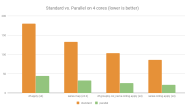Python 小而美的函数
python提供了一些有趣且实用的函数,如any all zip,这些函数能够大幅简化我们得代码,可以更优雅的处理可迭代的对象,同时使用的时候也得注意一些情况
any
any(iterable)-
Return True if any element of the iterable is true. If the iterable is empty, return False
如果序列中任何一个元素为True,那么any返回True。该函数可以让我们少些一个for循环。有两点需要注意
(1)如果迭代器为空,返回的是False
(2)具有短路求值性质,即如果迭代器中某个元素返回True,那么就不会对后面的元素求值。
笔者曾经犯过这么一个错误
ret = any(self.calc_and_ret(e) for e in elements)
def self.calc_and_ret(self, e):
# do a lot of calc here which effect self
return True(or False)
本意是希望对所有的element都计算,然后返回一个结果。但事实上由于短路求值, 可能后面很多的元素都不会再调用calc_and_ret
all
all(iterable)-
Return True if all elements of the iterable are true (or if the iterable is empty
当所有元素都为True时,all函数返回True。两点注意
(1)如果迭代器为空,返回的是True
(2)具有短路求值性质,即如果迭代器中某个元素返回False,那么就不会对后面的元素求值。
sum
sum(iterable[, start])-
Sums start and the items of an iterable from left to right and returns the total. start defaults to
0.
sum用来对迭代器的数值求和,且可以赋予一个初始值(默认为0)。注意
(1)如果是空的迭代器,返回0
max min
分别返回可迭代序列的最大值 最小值。注意事项
(1)如果是空的迭代器,会抛异常(ValueError)
zip
接受n个序列作为参数,返回tuple的一个列表,第i个tuple由每个序列的第i个元素组成。for example
>>> zip((1,2,3), (‘a’, ‘b’, ‘c’))
[(1, ‘a’), (2, ‘b’), (3, ‘c’)]
>>> zip((1,2,3), (‘a’, ‘b’, ‘c’), (True, False, True))
[(1, ‘a’, True), (2, ‘b’, False), (3, ‘c’, True)]
注意:
(1)作为参数的序列长度可以不一致,以长度最短的序列为准。for example
>>> zip((1,2,3), (‘a’, ‘b’))
[(1, ‘a’), (2, ‘b’)]
(2)即使参数只有一个序列,返回值也是a list of tuple
>>> zip((1,2,3))
[(1,), (2,), (3,)]
itertools.izip
功能能zip,不过返回值是iterator,而不是list
enumerate
这个函数大家应该都有使用过,用来返回序列中元素的下标和元素。同时容易被忽略的是:enumerate 还接受一个参数作为下标的开始
enumerate(sequence[, start=0])我们知道在Python以及大多数编程语言中,数组(序列)的下标都是以0开始(lua除外)。但在现实中,比如排行,我们都是说第一名,而不是第0名。所以start=1可能是个好主意。
>>> for idx, e in enumerate((‘a’, ‘b’, ‘c’), 1):
… print idx, e
…
1 a
2 b
3 c




